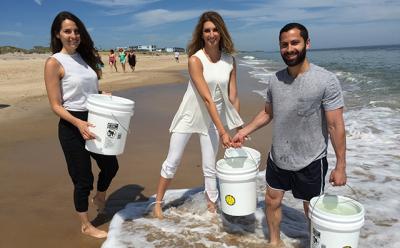Montauk Original: Ditch Plain Salt

Sam Gelin was enjoying a nice piece of fish that had come from Montauk one day not long ago in New York when he thought it would be really interesting to use salt that derived from the same waters. He had recently traveled on the West Coast, where he had seen a sea salt company, and it “kind of lodged in my mind,” he said in a recent interview. And so the Montauk Salt Company was born.
Mr. Gelin’s company is one of many food companies started by millennials, who are said to be obsessed with food. Though the definition of millennial varies based on whom you ask, many publications, including The New York Times, have defined the generation as those born between 1978 and 1998.
Mr. Gelin is among other millennial entrepreneurs, including Matthew Corrin, who started Freshii, a healthy fast-food chain, when he was 23, and three college students who launched Sweetgreen, a salad chain. And his company isn’t the only one owned by millennials in Montauk: Sea Bean Natural Foods, a catering company and food truck, is operated by Shawn Christman who is 34 years old.
Mr. Gelin, who had frequently visited Montauk, began researching and collecting ocean water from Ditch Plain last October. He said it took a couple of months of experimenting to get to a point where he produced a viable sea salt. In January, he drew curious looks while collecting water barefoot at Ditch Plain for what would become his first commercial batch.
“It was freezing. Nothing about it felt good. But I wanted to do that,” he said, explaining that “the benefit of collecting cold water is it speeds up the filtration process.”
Since then, Mr. Gelin has made the trek from his East Village apartment to Montauk about every two weeks to wade waist deep into the water and harvest bucket after bucket of water, regardless of the season, but only after he checks water quality reports from the eastern Long Island chapter of the Surfrider Foundation. Twenty buckets at a time, holding five gallons each, get loaded into his Jeep.
Then, working in a rented commercial kitchen, Mr. Gelin boils the water to kill any bacteria and to begin the evaporation process, which eventually yields what he describes as a crisp, fresh product best used as a finishing salt.
“We boil it down into a brine, and then through regulating the temperature at which the salt cools, we can create these really nice, resilient flakes,” Mr. Gelin said. “As we’re harvesting the salt from a really briny water, the salt will come dance along the top and we’ll scoop it out and put it on the side and let it cool off. Once it’s cooled off, we put it in the dehydrator, where it will dry out. There’s a bit of an art to it.”
From start to finish, the Montauk Salt Company process takes about three days. His method differs in technique and the salt differs from that made by the Amagansett Sea Salt Company, which was founded in 2009. It uses solar evaporation and flavors its salt with lemon zest, herbs, and merlot, or other savories.
“Because there are so many variables on how you produce it and finish it, there are so many different ways it can turn out,” Mr. Gelin said.
He recommends his company’s salt with eggs, steak, or kale salad. “The salt that we produce doesn’t dissipate as quickly as table salt. It tends to last longer, so you do get a little bit of texture when you go to enjoy your dish.”
Mr. Gelin has a background in the food and hospitality industries. He is the founder of Craft Hospitality, which produces the New York City Craft Distillers Festival and Craft Coffee Festival. He calls sea salt “a fun marriage of my culture growing up, with a mother who was a chemical engineer, and my appreciation for source-of-origin foods.”
With the Montauk Salt Company, he has help from his girlfriend, Jess Smoak, and from Danielle Gingerich, a Sag Harbor resident and partner in the business. Provisions in Sag Harbor and Left Hand Coffee in Montauk sell the salt and Duryea’s and Swallow East, Montauk restaurants, are making it available for diners.
“I’m excited about it and want to share it with as many people as possible. I think our generation wants to know where their food is coming from. I think that’s why the Montauk Salt Company story is compelling.”
